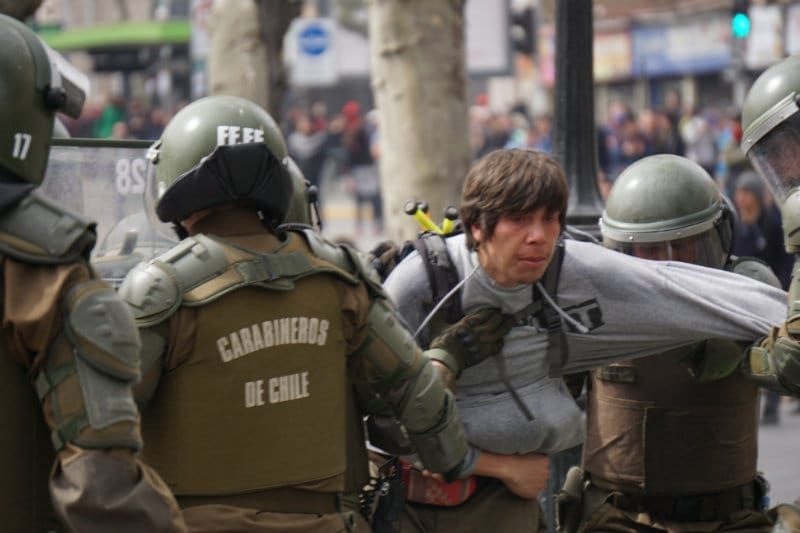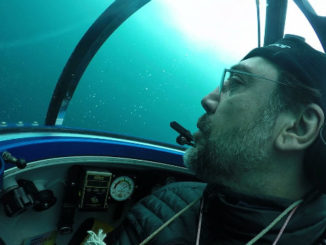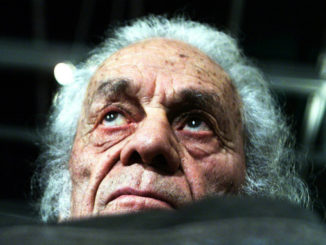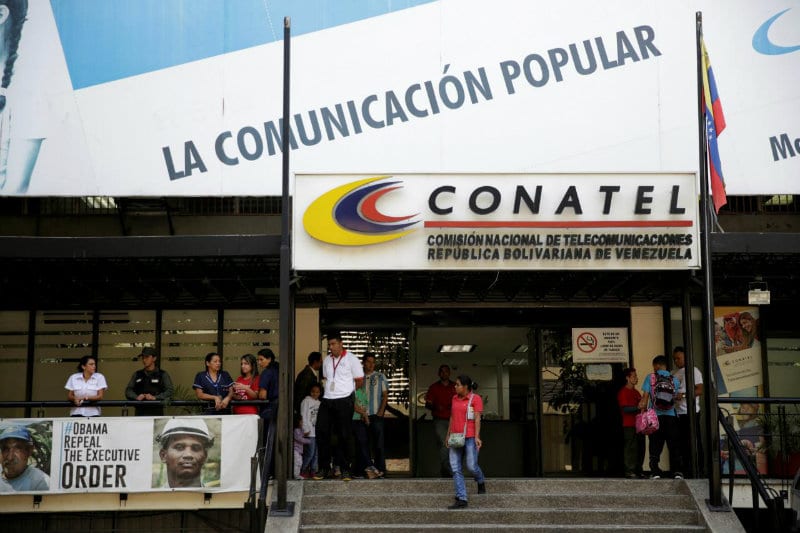
Isabel Cocker / The Santiago Times Staff
Just days before the presidential elections, reporter Isabel Cocker returns home, to the United Kingdom. Through her work for The Santiago Times she got to know Chile from a unique perspective, from reporting on Mapuche and student protests to interviewing presidential candidates. She now looks back on her work for ST.

On Sunday, Chile will be choosing its next President in an election which has been getting more highly-contested by the day. On the night of the first presidential election in November, I was in the thick of the action at the campaign headquarters of Alejandro Guillier, following the results minute-by-minute and analysing the reactions of his crowd of supporters. However, by Sunday, I will have returned to England, a place which reports so little on Chilean news that not even the elections made it into the Guardian.
The Eurocentric viewpoint of Britain, a country which pays little attention to any world news which does not directly affect its own population, did not prepare me for working for the Santiago Times. It was a steep learning curve, and I thought that own university learning of Chilean history and culture would play almost no part in the day-to-day news.
One of the first news stories I reported on was the burning of lorries in the Araucanía by Mapuche protest groups. I did my research on a fairly base level, wrote an article, and then moved on. To me, it was an act of vandalism, nothing more, as I hadn’t yet realized how deeply the controversial treatment of the Mapuche people was etched into the psyche of many Chileans.
 Nevertheless, I soon realized that everything in Chile, apart from maybe football, is related to a much deeper historical dialogue affecting race and class. This undercurrent of racism and class struggle is pushed under a rug, and ignored by politicians bragging about the great leaps forward Chile has made in the last decades. It is almost as if they feel there is no need to address the problems of marginalized groups who don’t have the right to complain when politicians have done so much to benefit the entire country.
Nevertheless, I soon realized that everything in Chile, apart from maybe football, is related to a much deeper historical dialogue affecting race and class. This undercurrent of racism and class struggle is pushed under a rug, and ignored by politicians bragging about the great leaps forward Chile has made in the last decades. It is almost as if they feel there is no need to address the problems of marginalized groups who don’t have the right to complain when politicians have done so much to benefit the entire country.
The Mapuche “problem”, as it’s often euphemistically called in the Chilean press, is one of many issues I wrote about in the beginning without fully realizing how deeply it was rooted in historical injustices carried forward to the present day. Throughout my time in Chile, there have been multiple debates in parliament over the imposition of the Terrorism Law, which could be used to “subdue” the Mapuche protesters and take away basic rights whilst they are in prison and awaiting trial. This law, whose use has been condemned by the United Nations, is a throwback to the Pinochet dictatorship – another trace of the past that the government pretends has no effect on the current population.
 There have been widespread protests over the inhumane treatment of Mapuche prisoners, over the treatment of women, over the imposition of laws controlling the education system. I was shocked when I arrived and saw police greeting protesters with water cannons and riot shields, and when I choked coming down into the lobby of my apartment block after tear gas had been thrown in the square outside. Yet, it soon became normal and every day. I realized how blasé I had become when I followed the Women’s March of December 1st and was surprised at the lack of police violence towards the protesters.
There have been widespread protests over the inhumane treatment of Mapuche prisoners, over the treatment of women, over the imposition of laws controlling the education system. I was shocked when I arrived and saw police greeting protesters with water cannons and riot shields, and when I choked coming down into the lobby of my apartment block after tear gas had been thrown in the square outside. Yet, it soon became normal and every day. I realized how blasé I had become when I followed the Women’s March of December 1st and was surprised at the lack of police violence towards the protesters.
It hasn’t all been protests and violence, although as a reporter and photographer whose attention is piqued by conflict, I was always going to be interested in the issues forcing the country to react in the streets. There were celebrations over the passing of the Abortion Law, through which Chile became the final country in South America to allow abortions in limited cases. There was the celebration of Pride, and President Bachelet’s proposal of an Equal Marriage Bill for homosexual couples. However, in the weeks and months following Bachelet’s approval of the controversial draft bill, reports continue to trickle in of men and women being beaten, even killed, for their sexuality.
And, of course, most of these issues have been reported on through the lens of the upcoming Presidential Elections. As an English reporter, used to the British government and its system of three major parties, it took me a while to get my head around the 8 candidates for the Presidency, and even longer to work out the structure of its 28 different political parties. Not that I’m the only one – in a completely unscientific study, most of the people in my Chilean running group failed to name all of the candidates for Presidency even a month before the election.
 I was lucky enough to be involved with interviews with many of the Presidential Candidates, and so was exposed to a whole range of views regarding the future of the country and how best to change it. I heard politicians pleading for the rights of homosexual couples to adopt children, and others stating their intent to repeal the abortion bill. There were comparisons of Chile with Venezuela, but also threats to abandon Maduro’s country without aid. Most interestingly were the historical views: some seeing the Pinochet dictatorship as an effective tool for the country’s improvement, and others condemning the violence and destruction of the military government.
I was lucky enough to be involved with interviews with many of the Presidential Candidates, and so was exposed to a whole range of views regarding the future of the country and how best to change it. I heard politicians pleading for the rights of homosexual couples to adopt children, and others stating their intent to repeal the abortion bill. There were comparisons of Chile with Venezuela, but also threats to abandon Maduro’s country without aid. Most interestingly were the historical views: some seeing the Pinochet dictatorship as an effective tool for the country’s improvement, and others condemning the violence and destruction of the military government.
In these last few months, it’s become clearer to me that history and historical events still play a huge role in current politics and in the day-to-day lives of the citizens. What is problematic is the seeming refusal of politicians to face-up to the importance of its history with all of its contradictions. There are many citizen-led organisations who focus on the “memory” of the country, and these are starting to raise awareness amongst certain parts of the population. But this doesn’t seem to have extended into politics, who pay lip service to history without ever confronting it.
People are becoming increasingly dissatisfied with the establishment, as evidenced by the unexpectedly-high support in the first round of the elections for Beatriz Sánchez on the left, and the ultra-right conservative José Antonio Kast. Moving away from the center, citizens are looking for something – anything – that may change their country. But that time has not yet come, and although a groundswell of dissatisfaction may be bubbling on the streets, it hasn’t yet transferred to the ballot boxes.

I am interested to see which direction Chile chooses to take: back to the tried-and-tested governance of Piñera, or embracing change with Alejandro Guillier. However, I am not hopeful that either of these will provide the boost that Chile needs to revitalize the country – not economically, but personally.
I wish I could stay longer, and follow the country as it starts to embrace a younger political establishment, one more in-touch with the population. I think Chile is starting to enter into years that could be formative, but they can only do this by making peace with the past and using it to inform the future. I will be following as closely as I can from England, and I hope to return one day to work here again. The past four months have been a learning experience like no other, but I feel like I barely began to understand the country before having to leave. Adios Chile, or rather, Hasta luego, strange and contradictory country. Que le vaya bien.



